Business Law: Analysis of Sale of Goods and Consumer Rights Issues
VerifiedAdded on 2020/06/06
|9
|2464
|217
Report
AI Summary
This report delves into the intricacies of business law, specifically focusing on the sale of goods and consumer rights, using a case study involving a faulty television set purchased by Mr. John. It meticulously analyzes the legal framework under the Sale of Goods Act 1979 and the Consumer Rights Act 2015, outlining the responsibilities of both the seller (departmental store) and the buyer. The report addresses key aspects such as the implied terms of the sale, including satisfactory quality, fitness for purpose, and correspondence with description. It further examines statutory provisions related to the transfer of property, possession, and the remedies available to both buyers and sellers in cases of breach of contract, particularly concerning faulty goods. The analysis covers the application of product liability provisions, emphasizing the legal obligations of the seller and the rights of the consumer, Mr. John, to seek redress, including refunds, repairs, or replacements. The report concludes by underscoring the importance of adhering to legal regulations in the sale and supply of goods to mitigate disputes and protect the interests of both parties involved.
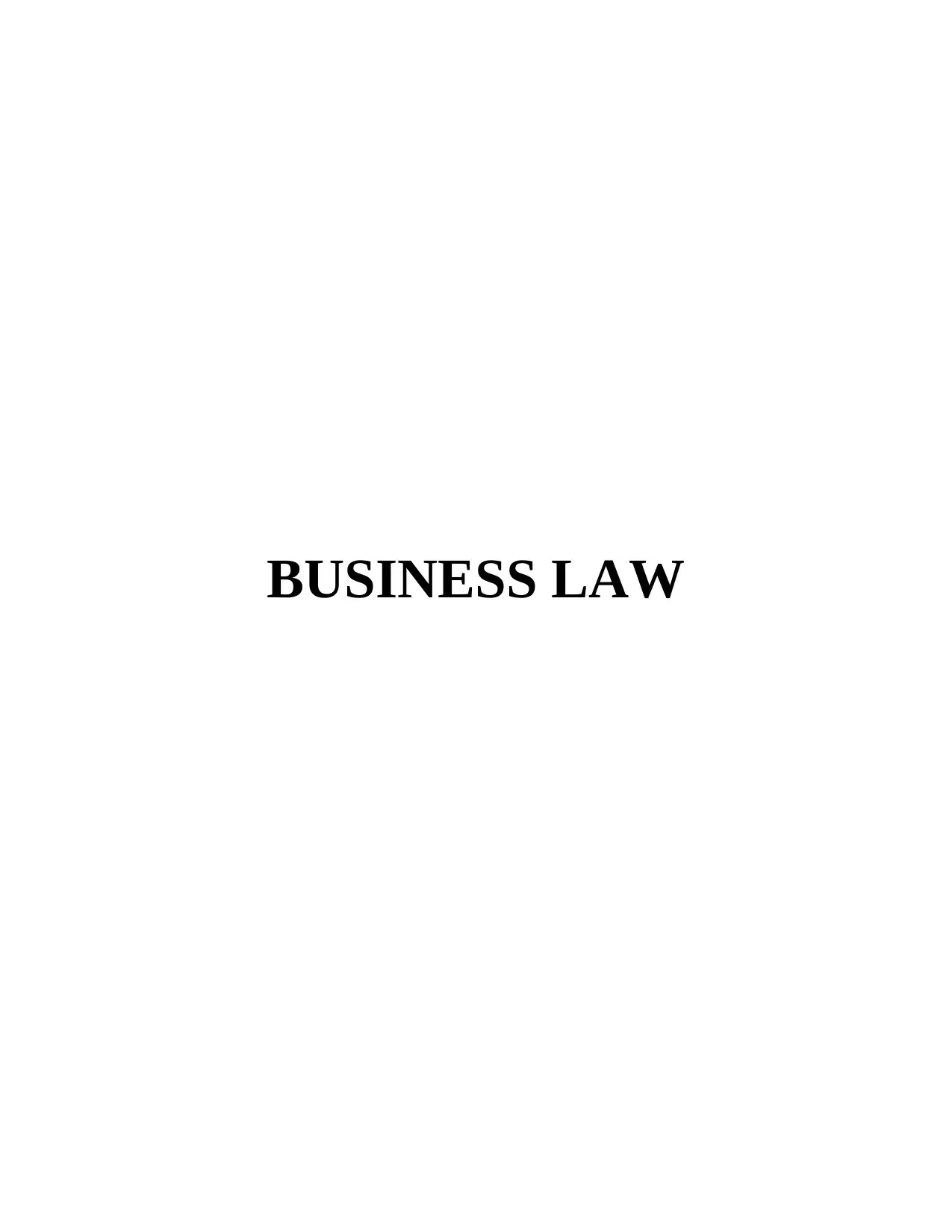
BUSINESS LAW
Paraphrase This Document
Need a fresh take? Get an instant paraphrase of this document with our AI Paraphraser
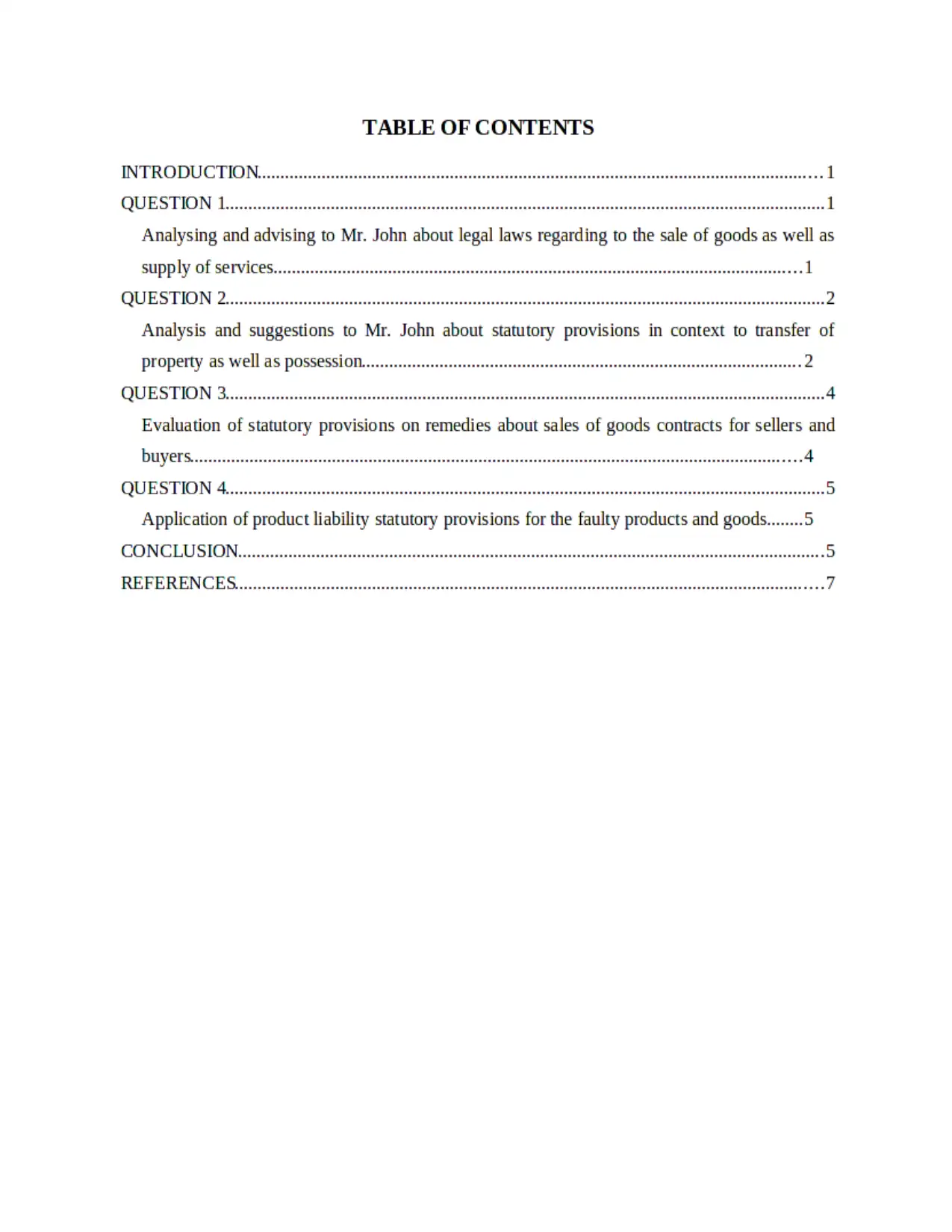
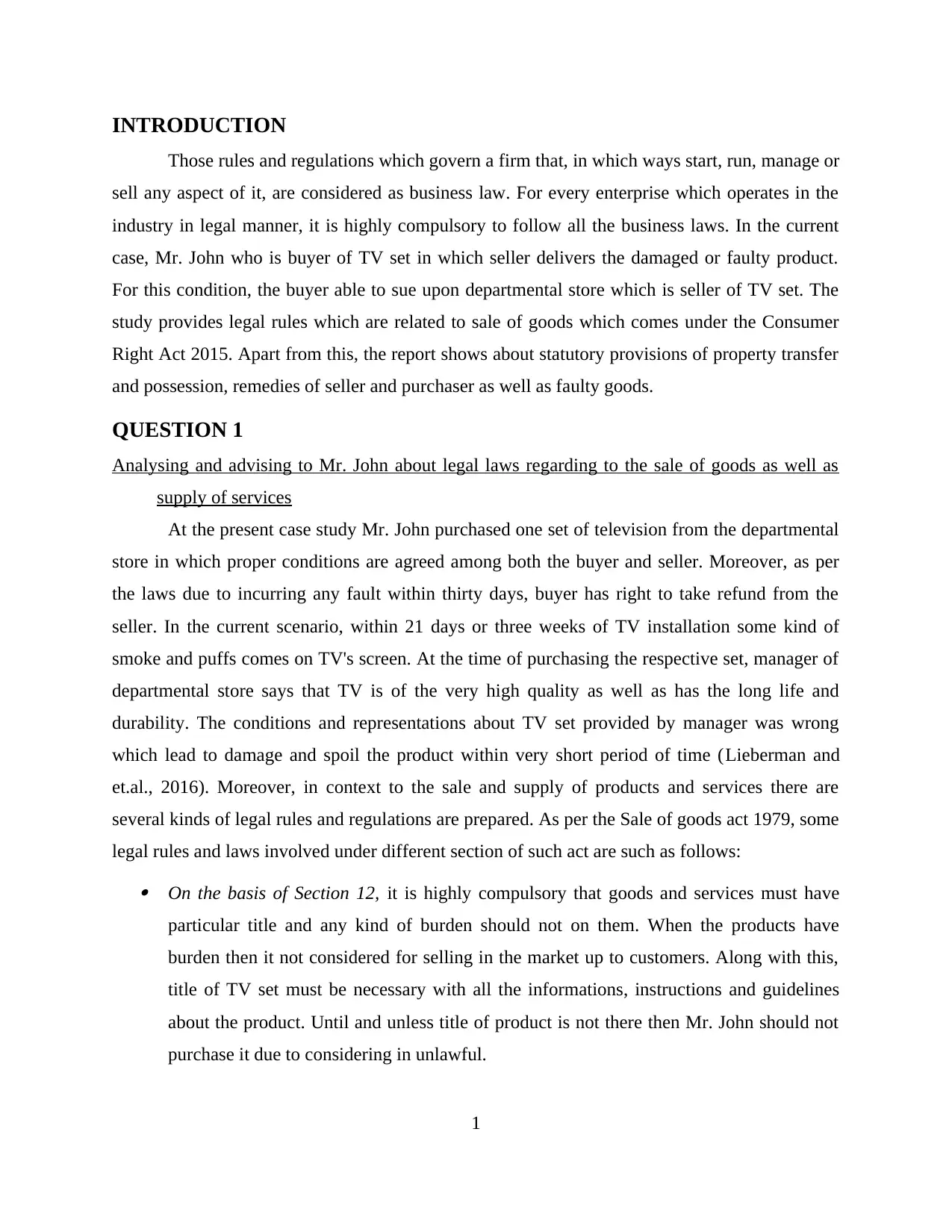
INTRODUCTION
Those rules and regulations which govern a firm that, in which ways start, run, manage or
sell any aspect of it, are considered as business law. For every enterprise which operates in the
industry in legal manner, it is highly compulsory to follow all the business laws. In the current
case, Mr. John who is buyer of TV set in which seller delivers the damaged or faulty product.
For this condition, the buyer able to sue upon departmental store which is seller of TV set. The
study provides legal rules which are related to sale of goods which comes under the Consumer
Right Act 2015. Apart from this, the report shows about statutory provisions of property transfer
and possession, remedies of seller and purchaser as well as faulty goods.
QUESTION 1
Analysing and advising to Mr. John about legal laws regarding to the sale of goods as well as
supply of services
At the present case study Mr. John purchased one set of television from the departmental
store in which proper conditions are agreed among both the buyer and seller. Moreover, as per
the laws due to incurring any fault within thirty days, buyer has right to take refund from the
seller. In the current scenario, within 21 days or three weeks of TV installation some kind of
smoke and puffs comes on TV's screen. At the time of purchasing the respective set, manager of
departmental store says that TV is of the very high quality as well as has the long life and
durability. The conditions and representations about TV set provided by manager was wrong
which lead to damage and spoil the product within very short period of time (Lieberman and
et.al., 2016). Moreover, in context to the sale and supply of products and services there are
several kinds of legal rules and regulations are prepared. As per the Sale of goods act 1979, some
legal rules and laws involved under different section of such act are such as follows: On the basis of Section 12, it is highly compulsory that goods and services must have
particular title and any kind of burden should not on them. When the products have
burden then it not considered for selling in the market up to customers. Along with this,
title of TV set must be necessary with all the informations, instructions and guidelines
about the product. Until and unless title of product is not there then Mr. John should not
purchase it due to considering in unlawful.
1
Those rules and regulations which govern a firm that, in which ways start, run, manage or
sell any aspect of it, are considered as business law. For every enterprise which operates in the
industry in legal manner, it is highly compulsory to follow all the business laws. In the current
case, Mr. John who is buyer of TV set in which seller delivers the damaged or faulty product.
For this condition, the buyer able to sue upon departmental store which is seller of TV set. The
study provides legal rules which are related to sale of goods which comes under the Consumer
Right Act 2015. Apart from this, the report shows about statutory provisions of property transfer
and possession, remedies of seller and purchaser as well as faulty goods.
QUESTION 1
Analysing and advising to Mr. John about legal laws regarding to the sale of goods as well as
supply of services
At the present case study Mr. John purchased one set of television from the departmental
store in which proper conditions are agreed among both the buyer and seller. Moreover, as per
the laws due to incurring any fault within thirty days, buyer has right to take refund from the
seller. In the current scenario, within 21 days or three weeks of TV installation some kind of
smoke and puffs comes on TV's screen. At the time of purchasing the respective set, manager of
departmental store says that TV is of the very high quality as well as has the long life and
durability. The conditions and representations about TV set provided by manager was wrong
which lead to damage and spoil the product within very short period of time (Lieberman and
et.al., 2016). Moreover, in context to the sale and supply of products and services there are
several kinds of legal rules and regulations are prepared. As per the Sale of goods act 1979, some
legal rules and laws involved under different section of such act are such as follows: On the basis of Section 12, it is highly compulsory that goods and services must have
particular title and any kind of burden should not on them. When the products have
burden then it not considered for selling in the market up to customers. Along with this,
title of TV set must be necessary with all the informations, instructions and guidelines
about the product. Until and unless title of product is not there then Mr. John should not
purchase it due to considering in unlawful.
1
⊘ This is a preview!⊘
Do you want full access?
Subscribe today to unlock all pages.

Trusted by 1+ million students worldwide
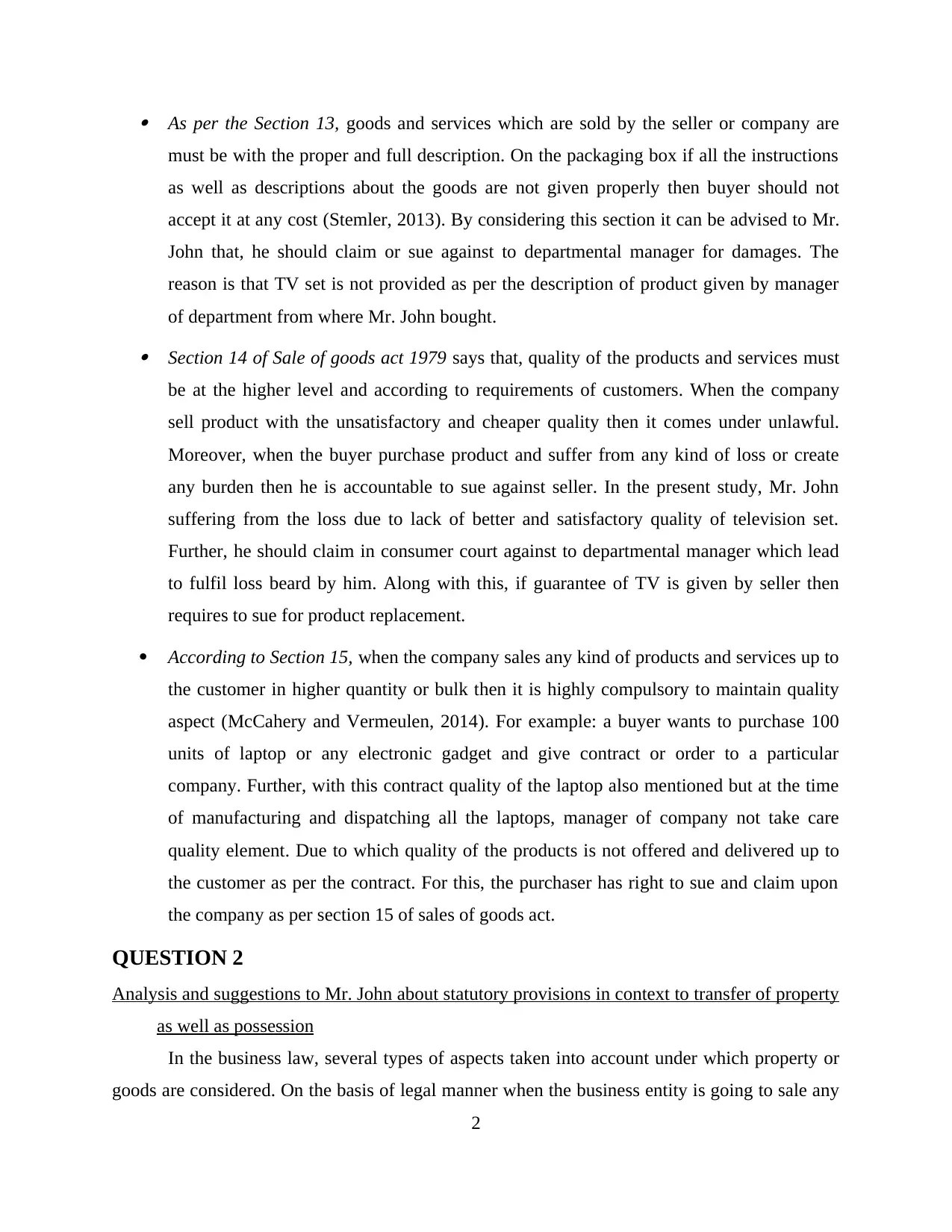
As per the Section 13, goods and services which are sold by the seller or company are
must be with the proper and full description. On the packaging box if all the instructions
as well as descriptions about the goods are not given properly then buyer should not
accept it at any cost (Stemler, 2013). By considering this section it can be advised to Mr.
John that, he should claim or sue against to departmental manager for damages. The
reason is that TV set is not provided as per the description of product given by manager
of department from where Mr. John bought. Section 14 of Sale of goods act 1979 says that, quality of the products and services must
be at the higher level and according to requirements of customers. When the company
sell product with the unsatisfactory and cheaper quality then it comes under unlawful.
Moreover, when the buyer purchase product and suffer from any kind of loss or create
any burden then he is accountable to sue against seller. In the present study, Mr. John
suffering from the loss due to lack of better and satisfactory quality of television set.
Further, he should claim in consumer court against to departmental manager which lead
to fulfil loss beard by him. Along with this, if guarantee of TV is given by seller then
requires to sue for product replacement.
According to Section 15, when the company sales any kind of products and services up to
the customer in higher quantity or bulk then it is highly compulsory to maintain quality
aspect (McCahery and Vermeulen, 2014). For example: a buyer wants to purchase 100
units of laptop or any electronic gadget and give contract or order to a particular
company. Further, with this contract quality of the laptop also mentioned but at the time
of manufacturing and dispatching all the laptops, manager of company not take care
quality element. Due to which quality of the products is not offered and delivered up to
the customer as per the contract. For this, the purchaser has right to sue and claim upon
the company as per section 15 of sales of goods act.
QUESTION 2
Analysis and suggestions to Mr. John about statutory provisions in context to transfer of property
as well as possession
In the business law, several types of aspects taken into account under which property or
goods are considered. On the basis of legal manner when the business entity is going to sale any
2
must be with the proper and full description. On the packaging box if all the instructions
as well as descriptions about the goods are not given properly then buyer should not
accept it at any cost (Stemler, 2013). By considering this section it can be advised to Mr.
John that, he should claim or sue against to departmental manager for damages. The
reason is that TV set is not provided as per the description of product given by manager
of department from where Mr. John bought. Section 14 of Sale of goods act 1979 says that, quality of the products and services must
be at the higher level and according to requirements of customers. When the company
sell product with the unsatisfactory and cheaper quality then it comes under unlawful.
Moreover, when the buyer purchase product and suffer from any kind of loss or create
any burden then he is accountable to sue against seller. In the present study, Mr. John
suffering from the loss due to lack of better and satisfactory quality of television set.
Further, he should claim in consumer court against to departmental manager which lead
to fulfil loss beard by him. Along with this, if guarantee of TV is given by seller then
requires to sue for product replacement.
According to Section 15, when the company sales any kind of products and services up to
the customer in higher quantity or bulk then it is highly compulsory to maintain quality
aspect (McCahery and Vermeulen, 2014). For example: a buyer wants to purchase 100
units of laptop or any electronic gadget and give contract or order to a particular
company. Further, with this contract quality of the laptop also mentioned but at the time
of manufacturing and dispatching all the laptops, manager of company not take care
quality element. Due to which quality of the products is not offered and delivered up to
the customer as per the contract. For this, the purchaser has right to sue and claim upon
the company as per section 15 of sales of goods act.
QUESTION 2
Analysis and suggestions to Mr. John about statutory provisions in context to transfer of property
as well as possession
In the business law, several types of aspects taken into account under which property or
goods are considered. On the basis of legal manner when the business entity is going to sale any
2
Paraphrase This Document
Need a fresh take? Get an instant paraphrase of this document with our AI Paraphraser
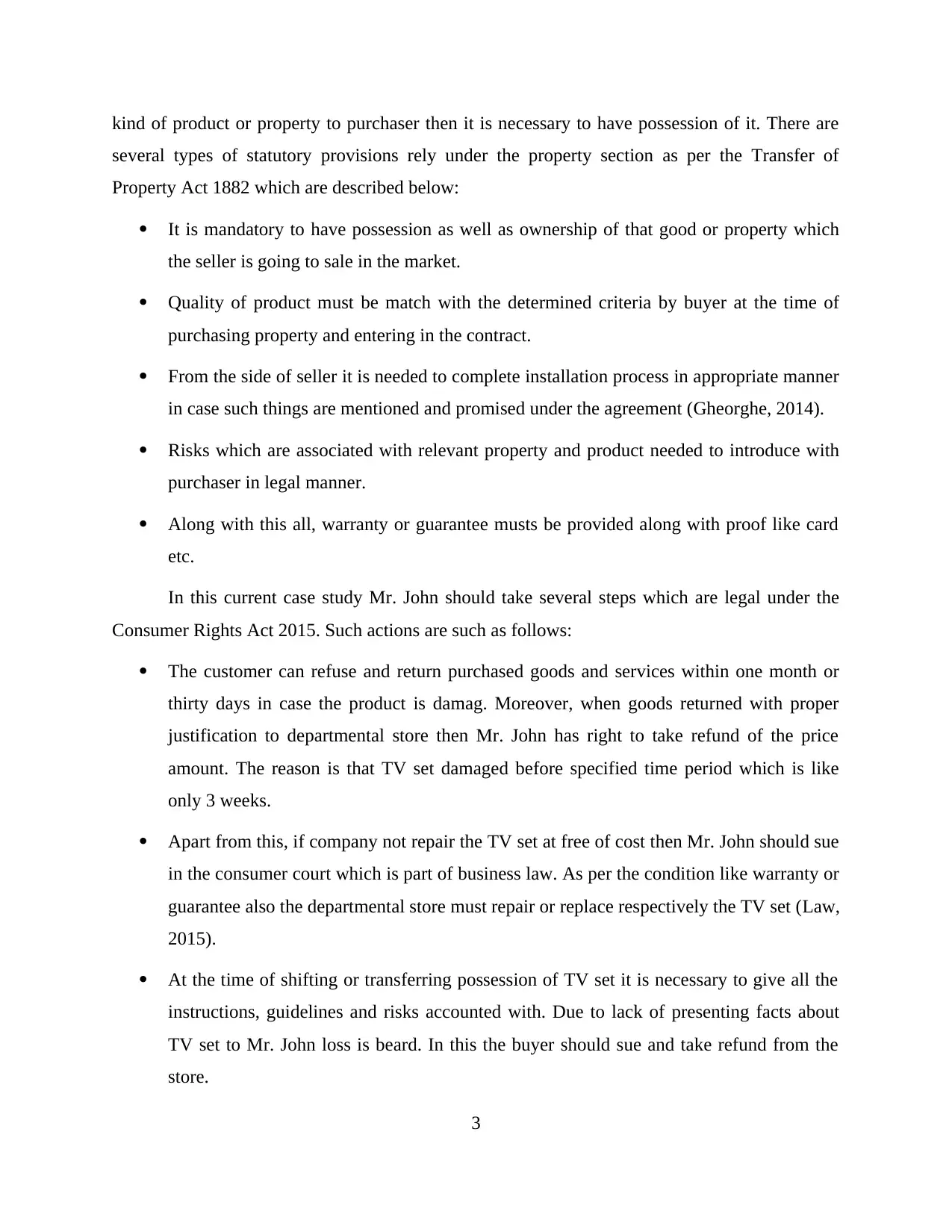
kind of product or property to purchaser then it is necessary to have possession of it. There are
several types of statutory provisions rely under the property section as per the Transfer of
Property Act 1882 which are described below:
It is mandatory to have possession as well as ownership of that good or property which
the seller is going to sale in the market.
Quality of product must be match with the determined criteria by buyer at the time of
purchasing property and entering in the contract.
From the side of seller it is needed to complete installation process in appropriate manner
in case such things are mentioned and promised under the agreement (Gheorghe, 2014).
Risks which are associated with relevant property and product needed to introduce with
purchaser in legal manner.
Along with this all, warranty or guarantee musts be provided along with proof like card
etc.
In this current case study Mr. John should take several steps which are legal under the
Consumer Rights Act 2015. Such actions are such as follows:
The customer can refuse and return purchased goods and services within one month or
thirty days in case the product is damag. Moreover, when goods returned with proper
justification to departmental store then Mr. John has right to take refund of the price
amount. The reason is that TV set damaged before specified time period which is like
only 3 weeks.
Apart from this, if company not repair the TV set at free of cost then Mr. John should sue
in the consumer court which is part of business law. As per the condition like warranty or
guarantee also the departmental store must repair or replace respectively the TV set (Law,
2015).
At the time of shifting or transferring possession of TV set it is necessary to give all the
instructions, guidelines and risks accounted with. Due to lack of presenting facts about
TV set to Mr. John loss is beard. In this the buyer should sue and take refund from the
store.
3
several types of statutory provisions rely under the property section as per the Transfer of
Property Act 1882 which are described below:
It is mandatory to have possession as well as ownership of that good or property which
the seller is going to sale in the market.
Quality of product must be match with the determined criteria by buyer at the time of
purchasing property and entering in the contract.
From the side of seller it is needed to complete installation process in appropriate manner
in case such things are mentioned and promised under the agreement (Gheorghe, 2014).
Risks which are associated with relevant property and product needed to introduce with
purchaser in legal manner.
Along with this all, warranty or guarantee musts be provided along with proof like card
etc.
In this current case study Mr. John should take several steps which are legal under the
Consumer Rights Act 2015. Such actions are such as follows:
The customer can refuse and return purchased goods and services within one month or
thirty days in case the product is damag. Moreover, when goods returned with proper
justification to departmental store then Mr. John has right to take refund of the price
amount. The reason is that TV set damaged before specified time period which is like
only 3 weeks.
Apart from this, if company not repair the TV set at free of cost then Mr. John should sue
in the consumer court which is part of business law. As per the condition like warranty or
guarantee also the departmental store must repair or replace respectively the TV set (Law,
2015).
At the time of shifting or transferring possession of TV set it is necessary to give all the
instructions, guidelines and risks accounted with. Due to lack of presenting facts about
TV set to Mr. John loss is beard. In this the buyer should sue and take refund from the
store.
3
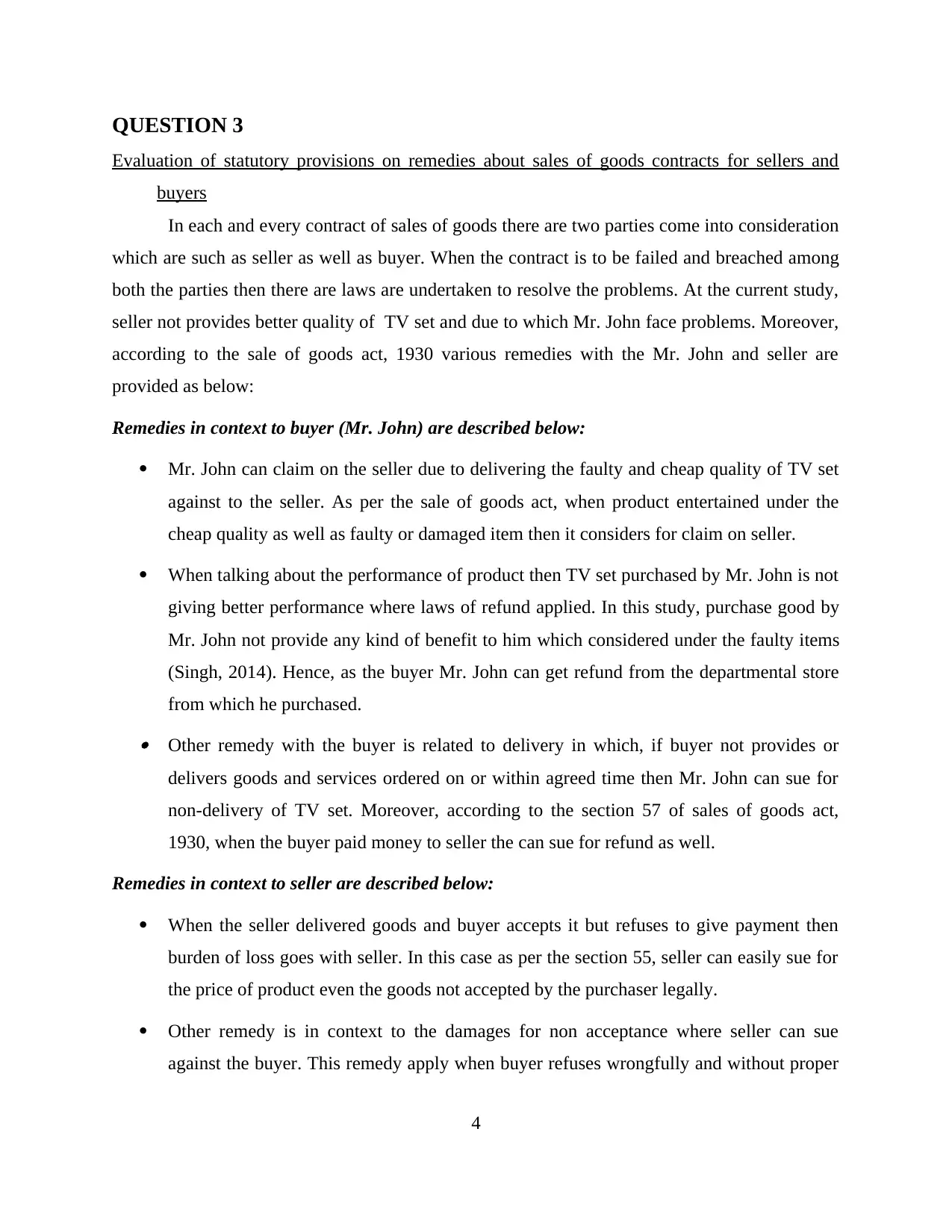
QUESTION 3
Evaluation of statutory provisions on remedies about sales of goods contracts for sellers and
buyers
In each and every contract of sales of goods there are two parties come into consideration
which are such as seller as well as buyer. When the contract is to be failed and breached among
both the parties then there are laws are undertaken to resolve the problems. At the current study,
seller not provides better quality of TV set and due to which Mr. John face problems. Moreover,
according to the sale of goods act, 1930 various remedies with the Mr. John and seller are
provided as below:
Remedies in context to buyer (Mr. John) are described below:
Mr. John can claim on the seller due to delivering the faulty and cheap quality of TV set
against to the seller. As per the sale of goods act, when product entertained under the
cheap quality as well as faulty or damaged item then it considers for claim on seller.
When talking about the performance of product then TV set purchased by Mr. John is not
giving better performance where laws of refund applied. In this study, purchase good by
Mr. John not provide any kind of benefit to him which considered under the faulty items
(Singh, 2014). Hence, as the buyer Mr. John can get refund from the departmental store
from which he purchased. Other remedy with the buyer is related to delivery in which, if buyer not provides or
delivers goods and services ordered on or within agreed time then Mr. John can sue for
non-delivery of TV set. Moreover, according to the section 57 of sales of goods act,
1930, when the buyer paid money to seller the can sue for refund as well.
Remedies in context to seller are described below:
When the seller delivered goods and buyer accepts it but refuses to give payment then
burden of loss goes with seller. In this case as per the section 55, seller can easily sue for
the price of product even the goods not accepted by the purchaser legally.
Other remedy is in context to the damages for non acceptance where seller can sue
against the buyer. This remedy apply when buyer refuses wrongfully and without proper
4
Evaluation of statutory provisions on remedies about sales of goods contracts for sellers and
buyers
In each and every contract of sales of goods there are two parties come into consideration
which are such as seller as well as buyer. When the contract is to be failed and breached among
both the parties then there are laws are undertaken to resolve the problems. At the current study,
seller not provides better quality of TV set and due to which Mr. John face problems. Moreover,
according to the sale of goods act, 1930 various remedies with the Mr. John and seller are
provided as below:
Remedies in context to buyer (Mr. John) are described below:
Mr. John can claim on the seller due to delivering the faulty and cheap quality of TV set
against to the seller. As per the sale of goods act, when product entertained under the
cheap quality as well as faulty or damaged item then it considers for claim on seller.
When talking about the performance of product then TV set purchased by Mr. John is not
giving better performance where laws of refund applied. In this study, purchase good by
Mr. John not provide any kind of benefit to him which considered under the faulty items
(Singh, 2014). Hence, as the buyer Mr. John can get refund from the departmental store
from which he purchased. Other remedy with the buyer is related to delivery in which, if buyer not provides or
delivers goods and services ordered on or within agreed time then Mr. John can sue for
non-delivery of TV set. Moreover, according to the section 57 of sales of goods act,
1930, when the buyer paid money to seller the can sue for refund as well.
Remedies in context to seller are described below:
When the seller delivered goods and buyer accepts it but refuses to give payment then
burden of loss goes with seller. In this case as per the section 55, seller can easily sue for
the price of product even the goods not accepted by the purchaser legally.
Other remedy is in context to the damages for non acceptance where seller can sue
against the buyer. This remedy apply when buyer refuses wrongfully and without proper
4
⊘ This is a preview!⊘
Do you want full access?
Subscribe today to unlock all pages.

Trusted by 1+ million students worldwide
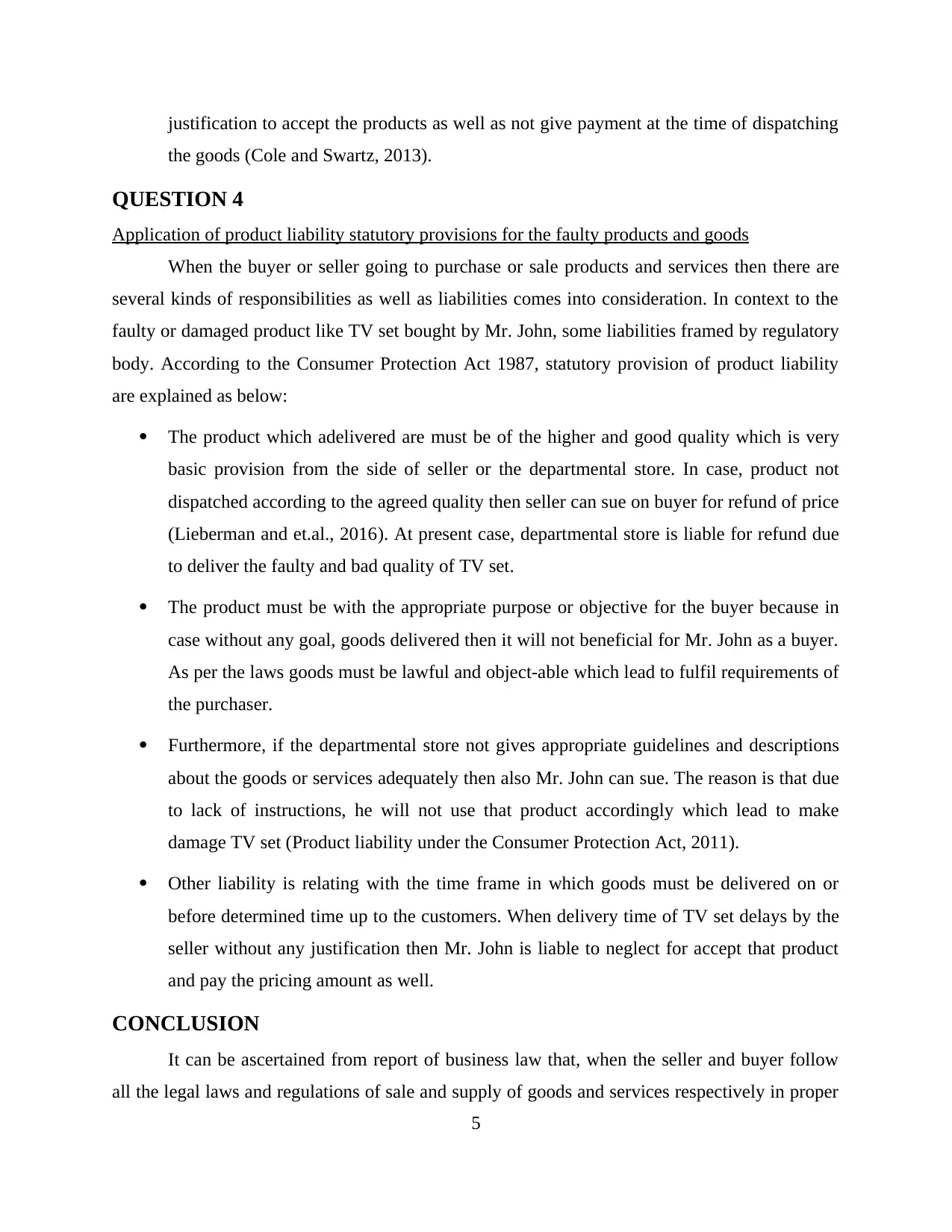
justification to accept the products as well as not give payment at the time of dispatching
the goods (Cole and Swartz, 2013).
QUESTION 4
Application of product liability statutory provisions for the faulty products and goods
When the buyer or seller going to purchase or sale products and services then there are
several kinds of responsibilities as well as liabilities comes into consideration. In context to the
faulty or damaged product like TV set bought by Mr. John, some liabilities framed by regulatory
body. According to the Consumer Protection Act 1987, statutory provision of product liability
are explained as below:
The product which adelivered are must be of the higher and good quality which is very
basic provision from the side of seller or the departmental store. In case, product not
dispatched according to the agreed quality then seller can sue on buyer for refund of price
(Lieberman and et.al., 2016). At present case, departmental store is liable for refund due
to deliver the faulty and bad quality of TV set.
The product must be with the appropriate purpose or objective for the buyer because in
case without any goal, goods delivered then it will not beneficial for Mr. John as a buyer.
As per the laws goods must be lawful and object-able which lead to fulfil requirements of
the purchaser.
Furthermore, if the departmental store not gives appropriate guidelines and descriptions
about the goods or services adequately then also Mr. John can sue. The reason is that due
to lack of instructions, he will not use that product accordingly which lead to make
damage TV set (Product liability under the Consumer Protection Act, 2011).
Other liability is relating with the time frame in which goods must be delivered on or
before determined time up to the customers. When delivery time of TV set delays by the
seller without any justification then Mr. John is liable to neglect for accept that product
and pay the pricing amount as well.
CONCLUSION
It can be ascertained from report of business law that, when the seller and buyer follow
all the legal laws and regulations of sale and supply of goods and services respectively in proper
5
the goods (Cole and Swartz, 2013).
QUESTION 4
Application of product liability statutory provisions for the faulty products and goods
When the buyer or seller going to purchase or sale products and services then there are
several kinds of responsibilities as well as liabilities comes into consideration. In context to the
faulty or damaged product like TV set bought by Mr. John, some liabilities framed by regulatory
body. According to the Consumer Protection Act 1987, statutory provision of product liability
are explained as below:
The product which adelivered are must be of the higher and good quality which is very
basic provision from the side of seller or the departmental store. In case, product not
dispatched according to the agreed quality then seller can sue on buyer for refund of price
(Lieberman and et.al., 2016). At present case, departmental store is liable for refund due
to deliver the faulty and bad quality of TV set.
The product must be with the appropriate purpose or objective for the buyer because in
case without any goal, goods delivered then it will not beneficial for Mr. John as a buyer.
As per the laws goods must be lawful and object-able which lead to fulfil requirements of
the purchaser.
Furthermore, if the departmental store not gives appropriate guidelines and descriptions
about the goods or services adequately then also Mr. John can sue. The reason is that due
to lack of instructions, he will not use that product accordingly which lead to make
damage TV set (Product liability under the Consumer Protection Act, 2011).
Other liability is relating with the time frame in which goods must be delivered on or
before determined time up to the customers. When delivery time of TV set delays by the
seller without any justification then Mr. John is liable to neglect for accept that product
and pay the pricing amount as well.
CONCLUSION
It can be ascertained from report of business law that, when the seller and buyer follow
all the legal laws and regulations of sale and supply of goods and services respectively in proper
5
Paraphrase This Document
Need a fresh take? Get an instant paraphrase of this document with our AI Paraphraser
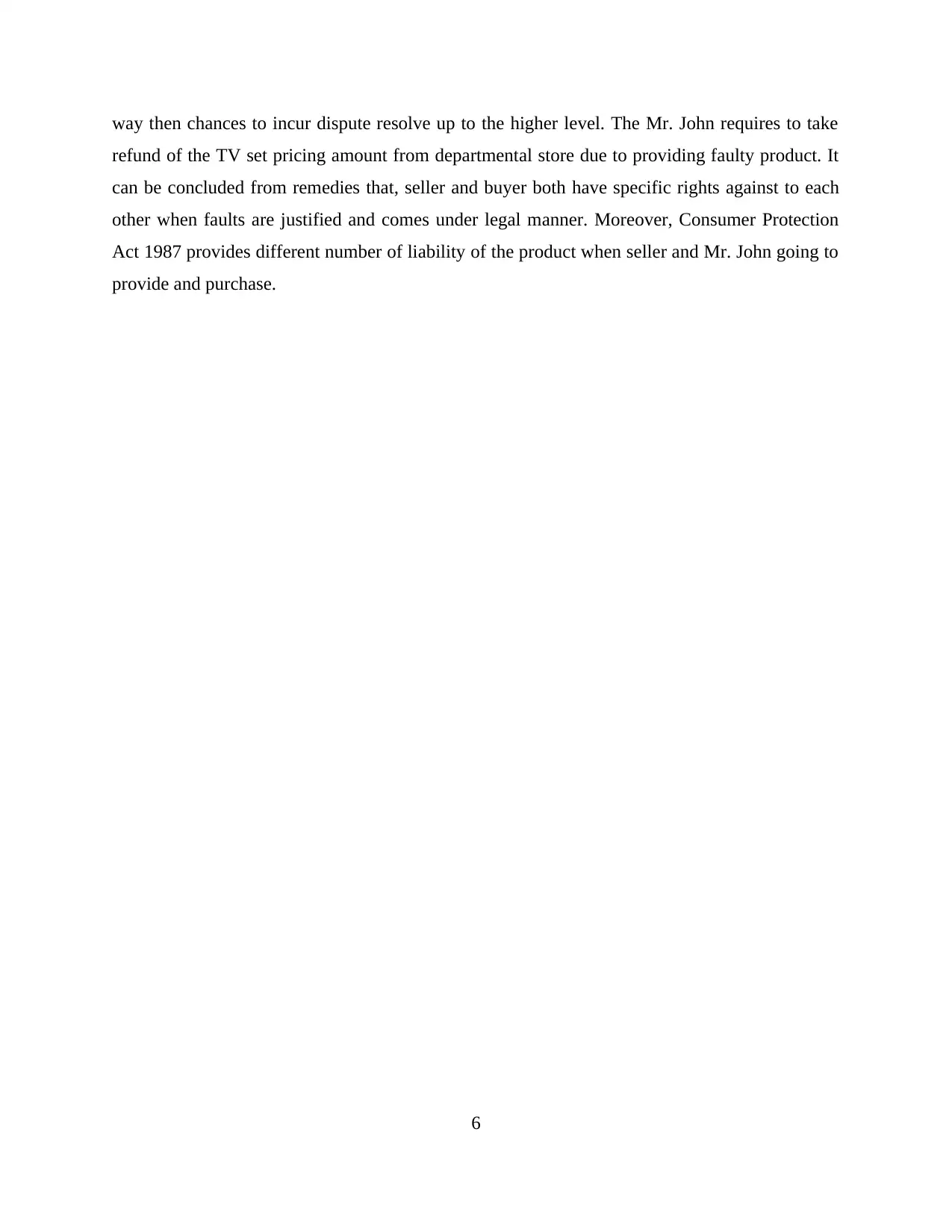
way then chances to incur dispute resolve up to the higher level. The Mr. John requires to take
refund of the TV set pricing amount from departmental store due to providing faulty product. It
can be concluded from remedies that, seller and buyer both have specific rights against to each
other when faults are justified and comes under legal manner. Moreover, Consumer Protection
Act 1987 provides different number of liability of the product when seller and Mr. John going to
provide and purchase.
6
refund of the TV set pricing amount from departmental store due to providing faulty product. It
can be concluded from remedies that, seller and buyer both have specific rights against to each
other when faults are justified and comes under legal manner. Moreover, Consumer Protection
Act 1987 provides different number of liability of the product when seller and Mr. John going to
provide and purchase.
6
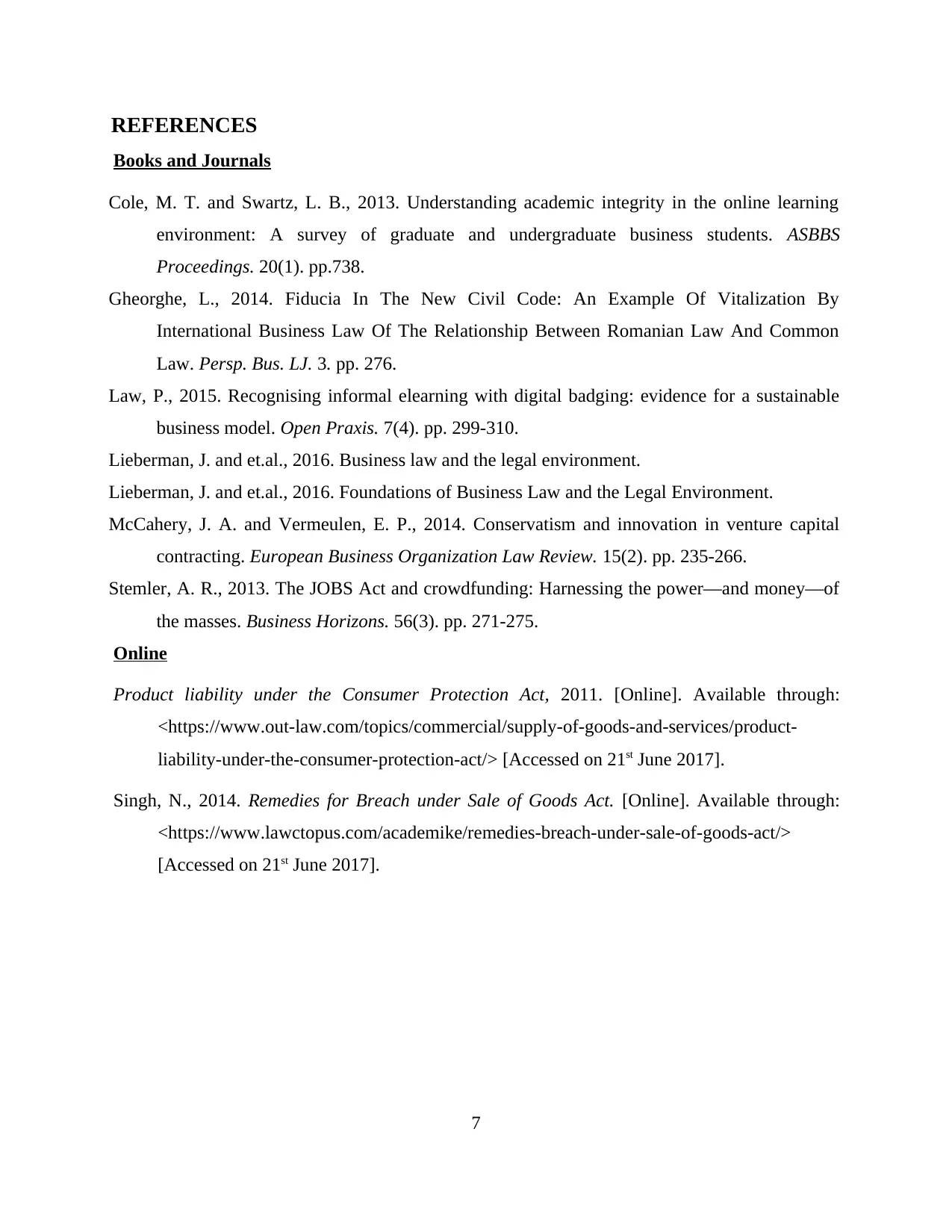
REFERENCES
Books and Journals
Cole, M. T. and Swartz, L. B., 2013. Understanding academic integrity in the online learning
environment: A survey of graduate and undergraduate business students. ASBBS
Proceedings. 20(1). pp.738.
Gheorghe, L., 2014. Fiducia In The New Civil Code: An Example Of Vitalization By
International Business Law Of The Relationship Between Romanian Law And Common
Law. Persp. Bus. LJ. 3. pp. 276.
Law, P., 2015. Recognising informal elearning with digital badging: evidence for a sustainable
business model. Open Praxis. 7(4). pp. 299-310.
Lieberman, J. and et.al., 2016. Business law and the legal environment.
Lieberman, J. and et.al., 2016. Foundations of Business Law and the Legal Environment.
McCahery, J. A. and Vermeulen, E. P., 2014. Conservatism and innovation in venture capital
contracting. European Business Organization Law Review. 15(2). pp. 235-266.
Stemler, A. R., 2013. The JOBS Act and crowdfunding: Harnessing the power—and money—of
the masses. Business Horizons. 56(3). pp. 271-275.
Online
Product liability under the Consumer Protection Act, 2011. [Online]. Available through:
<https://www.out-law.com/topics/commercial/supply-of-goods-and-services/product-
liability-under-the-consumer-protection-act/> [Accessed on 21st June 2017].
Singh, N., 2014. Remedies for Breach under Sale of Goods Act. [Online]. Available through:
<https://www.lawctopus.com/academike/remedies-breach-under-sale-of-goods-act/>
[Accessed on 21st June 2017].
7
Books and Journals
Cole, M. T. and Swartz, L. B., 2013. Understanding academic integrity in the online learning
environment: A survey of graduate and undergraduate business students. ASBBS
Proceedings. 20(1). pp.738.
Gheorghe, L., 2014. Fiducia In The New Civil Code: An Example Of Vitalization By
International Business Law Of The Relationship Between Romanian Law And Common
Law. Persp. Bus. LJ. 3. pp. 276.
Law, P., 2015. Recognising informal elearning with digital badging: evidence for a sustainable
business model. Open Praxis. 7(4). pp. 299-310.
Lieberman, J. and et.al., 2016. Business law and the legal environment.
Lieberman, J. and et.al., 2016. Foundations of Business Law and the Legal Environment.
McCahery, J. A. and Vermeulen, E. P., 2014. Conservatism and innovation in venture capital
contracting. European Business Organization Law Review. 15(2). pp. 235-266.
Stemler, A. R., 2013. The JOBS Act and crowdfunding: Harnessing the power—and money—of
the masses. Business Horizons. 56(3). pp. 271-275.
Online
Product liability under the Consumer Protection Act, 2011. [Online]. Available through:
<https://www.out-law.com/topics/commercial/supply-of-goods-and-services/product-
liability-under-the-consumer-protection-act/> [Accessed on 21st June 2017].
Singh, N., 2014. Remedies for Breach under Sale of Goods Act. [Online]. Available through:
<https://www.lawctopus.com/academike/remedies-breach-under-sale-of-goods-act/>
[Accessed on 21st June 2017].
7
⊘ This is a preview!⊘
Do you want full access?
Subscribe today to unlock all pages.

Trusted by 1+ million students worldwide
1 out of 9
Related Documents
Your All-in-One AI-Powered Toolkit for Academic Success.
+13062052269
info@desklib.com
Available 24*7 on WhatsApp / Email
![[object Object]](/_next/static/media/star-bottom.7253800d.svg)
Unlock your academic potential
Copyright © 2020–2025 A2Z Services. All Rights Reserved. Developed and managed by ZUCOL.




